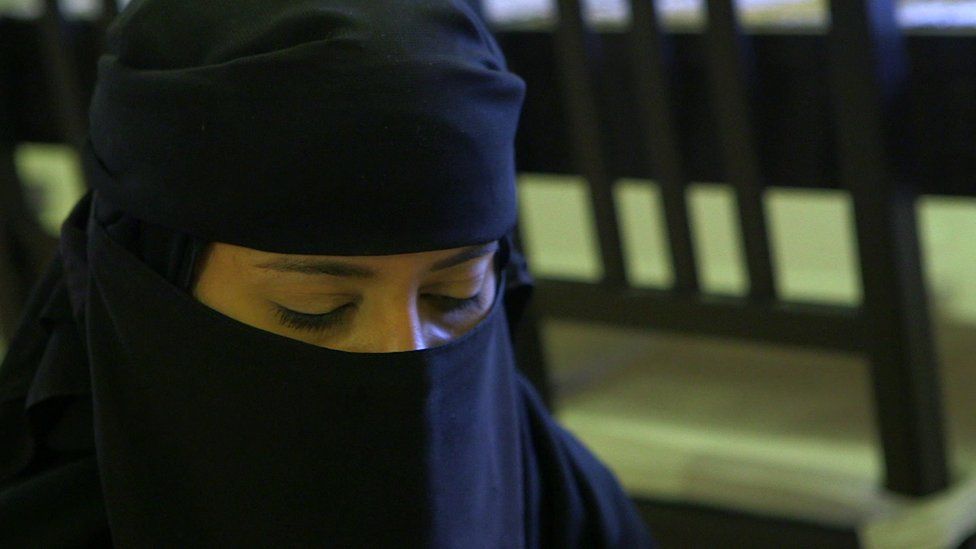Government policy 'negatively affects' Muslims
- Published

Government policies, including those linked to security and extremism, are having a "negative impact" on British Muslims, a campaign body's report says.
More than 60% of the 1,782 respondents to the report from the Islamic Human Rights Commission (IHRC) said they felt politicians did not care about them.
Some 56% said they had experienced verbal abuse, and 18% had faced physical assault.
The Home Office said it was committed to combating "anti-Muslim hatred".
Of those questioned, 59% believed political policies had negatively impacted their lives. A smaller study by the organisation in 2010 recorded nearly a third of people as saying this.
Find out more
Watch Divya Talwar's film in full here.
In the latest survey, more than half (58%) said they had been treated with suspicion by society, while 93% said they had seen negative stereotypes of Muslims portrayed in the media.
The research, which was not conducted in the same way as standard opinion polls, also included in-depth interviews with 50 people.
'Silencing Muslims'
The IHRC has been carrying out research into discrimination against Muslims for nearly two decades.
The report's author, Arzu Merali, said: "We have an environment now, where Muslim people feel they are suspected and where life is increasingly difficult.
"The impact of government policies, in particular those related with security, have really had an impact on silencing Muslims - not from a point of view of just talking about political issues, but even to report anti-Muslim hatred," she added.
Iman's story
Iman, 19, a white Muslim convert, told Asian Network's Divya Talwar that her college suspected she may have been radicalised
Iman, 19, is a white Muslim convert. Her college suspected she may have been radicalised and reported her under the government's counter-extremism policy, Prevent.
"I converted two weeks before Ramadan started and decided I was going to start wearing the hijab, so I let my college know I'd be fasting just to ease them into it," she said.
"I guess that was enough for them to contact Prevent.
"Maybe they thought I was in [Islamic State] or running away to Syria, I don't know what went through their mind.
"Obviously they were concerned, thought the worst and Muslim stereotypes were pushed on me.
"I don't think they are doing that for people who become Christian, Hindu and Jewish - or atheists, even. Why is it just Islam?
"After I was reported I had a meeting with officers in which they questioned me about my views and beliefs.
"When they were satisfied I wasn't at risk, they tried to recruit me to work with them.
"I can't be a Muslim girl who is just trying to get an education, work and do normal things.
"I've either got to help fight radicalisation or I am becoming radicalised.
"There is no middle ground, I can't just be a normal Muslim. I have to be on one [end of the] spectrum or the other."
According to the report, most Muslims from all backgrounds felt they had experienced some form of prejudice.
Some 40% believed they had faced discrimination at work, while 36% said they had experienced discrimination in education.
Meanwhile, 56% said they had experienced verbal abuse, and 18% had faced physical assault.
Last month, the prime minister announced anti-Muslim hatred would be recorded by police forces in England and Wales as a specific hate crime for the first time.
This was welcomed by the IHRC, although Ms Merali said more needed to be done to tackle Islamophobia.
"What we really need is a cultural change, not just some laws here or there. Unfortunately, we have institutional problems that need to be addressed," she said.
A Home Office spokesman said: "This government is committed to combating all forms of hate crime and has done more than any other to counter anti-Muslim hatred."
He said policies such as Prevent were aimed at "protecting those who might be vulnerable to the poisonous and pernicious influence of radicalisation". And the government was "continuing to work in partnership with communities of all faith backgrounds to challenge those who spread hatred and intolerance".
The Victoria Derbyshire programme is broadcast on weekdays between 09:15 and 11:00 on BBC Two and the BBC News channel.
Listen to the report on Asian Network.
Are you affected by the issues raised in this story? Please email haveyoursay@bbc.co.uk with your experiences.
Please include a contact number if you are willing to speak to a BBC journalist. You can also contact us in the following ways:
- Email haveyoursay@bbc.co.uk
- WhatsApp: +44 7525 900971
- Send pictures/video to yourpics@bbc.co.uk
- Or Upload your pictures/video here
- Tweet: @BBC_HaveYourSay
- Send an SMS or MMS to 61124 or +44 7624 800 100